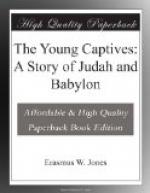“Given under my hand and seal, at the great City of Babylon, on this the fourth day of the seventh month.
“Nebuchadnezzar.”
The dedication of the great image now became the chief theme of conversation. In city and village, on hill and in dell, in the palace and cottage, it was the leading subject; and throughout the empire it gave universal satisfaction. The measure for the time being had its desired effect—to establish in the minds of the Chaldeans the conviction that the king was faithful to the gods.
This proclamation was received by the three Hebrews with profound astonishment and deep regret. For many years now they had enjoyed tranquility and Worshiped the God of their fathers in calm simplicity; and this was the first time, since they came to Babylon, that they were required to do violence to their conscience by worshiping a false god. Daniel, on business of great importance, was sent to Egypt.
The three worthies soon met for the special purpose of deciding upon a course of action to be followed in the approaching emergency. No fearful apprehensions could be read in those countenances. No fainting fear took hold of their spirits. Their eyes sparkled with holy courage, their cheeks flushed with noble emotions, their forms were unusually erect. They were fully prepared for the worst.
The opening remarks were from Hananiah.
“Well, brothers, another cloud seems to darken our skies, and to hang threateningly over our heads; but I trust that, as servants of the Host High, we have by this time learned to gaze upon such things without terror or alarm. We are now assembled together to take a calm, sober look at the thing as it really is, and decide on our future course. We are surely much indebted to the king. For a number of years, we have been the recipients of his bounty and the objects of his kind regard, for which, undoubtedly, we all feel grateful. But the question is this: is it our duty, as the professed worshipers of the God of Israel, to yield obedience to the demand of an unholy and wicked law, that throws insult into the face of the God of heaven, and the Jehovah of the universe? In this case, either obedience or disobedience must be pleasing to God. Is it the will of Jehovah that we should obey this law, or disobey it? To my mind, it is clear that, in this case, nothing short of a manly disobedience can be agreeable to the will of our God. Brothers, we must have decision of character. In this matter there must be no compromise with iniquity.”
And Hananiah took his seat with a smile of holy satisfaction playing on his lips, when Mishael arose, and said:
“The question rests here, brothers! Can any edict from any king, potentate, or human power, make null and void the laws of the eternal God? To this question, from us, there is but one short answer, and that is, ‘Nay!’ Is He not higher than the highest? Are not His commands far superior to all human edicts? The law of Jehovah is supreme, and let the higher law be obeyed, though the heavens should fall! Azariah, what sayest thou?”




